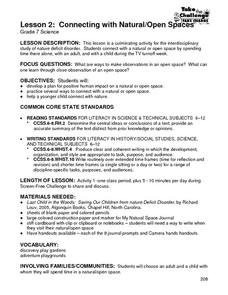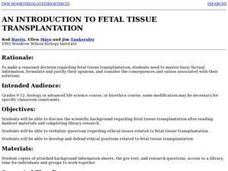Curated OER
Don't Let the Earth Down
Writing a persuasive argument starts with a clear thesis. Using this resource, your class will write a persuasive paper on a conservation issue. They will then transform their argument into a 30-second public service announcement. If...
Curated OER
Don't Let the Earth Down
Although recycling is definitely beneficial, reducing our waste and conserving our natural resources should really be the focus of environmentalists. Encourage the future generation to create a public service announcement about a...
Take the challenge
Connecting with Natural/Open Spaces
Get your class outside, away from the television, and maybe even learning something about nature while they're at it. Individuals will chose an open, natural space to spend time in for several days. Each day they will complete a page in...
Curated OER
Chameleons Are Cool!
Have your learners review what they know about camouflage using this lesson. Learners fill out a graphic organizer listing what they know or have questions about. This could be enhanced with the addition of a writing assignment in which...
Curated OER
An Introduction to Fetel Tissue Transplantation
Students explore fetal tissue transplantation. They research basic factual information and justify their opinions. They write a paper discussing their position. Students consider the consequences and values associated with their...
Curated OER
Wetlands in Danger
Fifth graders investigate the characteristics of wetlands. They conduct Internet research, complete a class KWL chart, and write a persuasive essay as a final project.
Curated OER
Environmental Law-Making
Learners go through the process of creating and passing a federal law. They select an environmental issue, research related policies for the issue, draft the bill, discuss it among committee members, bring it before the class and bring...
Curated OER
Scientific Approach to Forest Management
Students use wireless laptop computers to collect, store, communicate, and organize data from the 1999 Jasper Fire area. They collect data in the field and compare it to student-collected data from prior years to develop conclusions...







